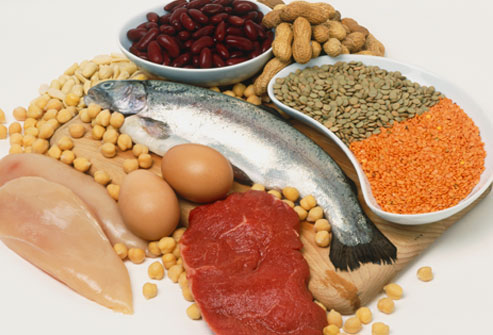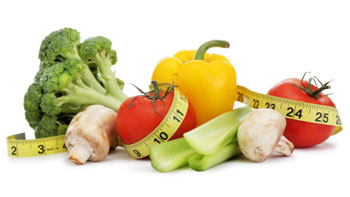As March is nutrition month, it’s only fitting my first content would be about nutrition and one of the most debated topics of nutrition / weight loss surrounds macronutrients and importance specifically protein. Here is a great post by Eirik Garnas which breaks down protein.
By Eirik Garnas
www.OrganicFitness.com
The obesity epidemic has quickly become one of the greatest health crises humans have ever faced, and billions of dollars are spent each year on research, supplements, and pharmaceuticals aimed at preventing and treating metabolic disorders. About two-thirds of the american population are now overweight or obese, and other affluent nations are not far behind. A lot of the focus has been on carbohydrate and fat as dietary causes of obesity, and rightly so, there are few health practitioners who don’t agree that an obesogenic environment with unlimited access to highly processed food is the primary driver behind the obesity epidemic. Low carb dieters and official health authorities heatedly argue whether we should get the majority of energy from fat or carbohydrate, and protein intake, which only constitutes about 15% of the typical western diet and has stayed largely constant throughout the development of the obesity epidemic, is sometimes forgotten.
We all know that potato chips, white bread, sweetened beverages, and other processed foods high in refined carbohydrates and/or fats are bad for health and weight loss. But, what if you eat a diet composed of nutritious whole foods such as meats, eggs, seafood, vegetables, legumes, fruits, and grass fed dairy, how does the macronutrient composition impact weight regulation then?
In an earlier guest post on BretContreras.com titled “Do carbohydrates Make You Fat?” I highlighted the fact that several traditional cultures have remained lean and healthy on diets with widely different macronutrient ratios, and that neither a high carbohydrate intake nor a high fat intake in itself leads to overweight and obesity as long as we eat the right types of food. Even though studies show that ad libitum low-carb diets are superior to ad libitum low-fat diets for weight loss, it seems that the increased fat loss doesn’t necessarily stem from the reduced carbohydrate consumption per se. However, the fact is that the general recommendation to get around 45-60% of daily energy from carbohydrate is on the high side for most people, and since we know that a lot of westerners have impaired glucose tolerance and insulin resistance, reducing carbohydrate intake is often beneficial.
Carbohydrates
So, eating a diet composed of nutrient-rich whole foods is clearly the first step for anyone who’s overweight and want to regain control of the homeostatic system that regulates fat storage on a long-term basis. In the article on carbohydrates I also briefly mentioned the importance of eating enough protein, but this is really a subject that deserves more attention. Although tweaking carbohydrate and fat intake can help boost fat loss, recent research suggest that regulating protein intake could be even more important.
Modern diets are low in protein
Official dietary recommendations are typically in the range of 10-20% of daily energy intake from protein, and some dietitians claim that “high” protein diets (>20%) increase your risk of kidney damage. However, it’s clear that the warnings against a protein intake that is slightly higher than the official dietary recommendations are ill founded (1,2). Layne Norton (PhD), an expert on protein synthesis, had the following to say about high protein diets: “… Much of this evidence I have presented not only contradicts statements that high protein diets are unsafe, but supports high protein diets in the prevention/treatment of heart disease, diabetes, and obesity. Those are three of the worldís biggest killers, and a high protein diet may be the key to reducing the incidence of all of them!” (1).
Although the exact intake of the different macronutrients in the human diet throughout our evolution varied depending on geographical location, season, and food availability. estimates show that the basic diets of our hunter-gatherer ancestors typically contained between 19-35% protein (3). This suggests that the so-called high protein diets consumed by strength trainees and heavy meat-eaters in present time actually contain a percentage of protein that is on the low-normal range when compared with the diets humans have eaten for hundreds of thousands of years.
While this doesn’t mean that you have to eat a lot of protein to be healthy, it highlights the apparent mismatch between the average protein intake of about 15% in the western diet and the typical protein consumption in the “default” human diet. So, while I’ll use the term high protein diet to describe a diet with a protein intake of above 20% of daily energy, the fact is that this level of protein consumption is only high by today’s standards.
In more recent times, epidemiological studies show that a decrease in percent dietary protein in the american diet between 1960 and 2006 was associated with an increase in total energy intake (4,5). These observational studies don’t tell us anything about cause and effect since several other confounding variables contributed to the change in energy intake during this time period, but they do provide a good starting place for developing hypotheses.
Protein-for-health
Since the absolute protein intake has stayed largely the same during this time period, there are basically two possible ways to look at dietary protein in relation to the obesity epidemic. One can either propose that the relatively constant protein intake within and across populations throughout the last 50 years suggests that protein doesn’t play a significant role in the obesity epidemic, or it’s possible to make the case that the relatively low protein intake can help explain why people tend to consume more calories than they need to maintain body weight.
Research suggests that protein is prioritized over fat, carbohydrate, and total energy intake
Studies in animals were some of the first to suggest that protein consumption plays a key role in regulating total energy intake (6). When spider monkeys, mice, pigs, and numerous other species are given a diet with a low percentage of protein, they tend to consume more total energy than when they are faced with a diet with a high protein content. The observation that mammals continue eating in an attempt to reach a targeted protein intake has also been shown in several human studies (6,7,8,9).
The idea that protein is prioritized over fat, carbohydrate, and total energy intake, and that a low percentage of protein in the diet leads to a higher total energy intake, has been labelled The Protein-Leverage Hypothesis.
In a randomized controlled study from 2011, researchers set out to test the protein leverage hypothesis by designing diets that were similar in terms of palatability and variety, but with a different percentage of protein (6). 22 lean subjects were told to eat as much as they wanted (ad libitum) from either a fixed menu containing 10%, 15% or 25% protein for 4 days. Participants eating a diet containing 10% protein ate more energy than the two other groups, and if the subjects had maintained the level of increased intake observed on the 10% protein diet they would have gained around 1.0 kg per month, given that their energy expenditure didn’t change. Total energy intake was the same in the groups getting 15% and 25% of their energy from protein, but since we know that the thermic effect of macronutrients is about 2-3% for lipids, 6-8% for carbohydrates and 25-30% for proteins (10), a diet with 25% protein will have a lower effective energy yield.
So, the varying thermic effect of the different macronutrients is one of the reasons why there exists a metabolic advantage for diets that are relatively high in protein (“a calorie is not a calorie”). You can basically eat more calories on a high protein diet than you can on a low protein diet without gaining fat.
Since protein has such a potent effect on satiety and energy expenditure it’s no surprise that high protein diets are very effective for weight loss. When people switch from a high-carb diet to a low-carb diet they tend to consume more meat, seafood, dairy, and eggs, and this increased protein intake is one of the major reasons why these diets are so effective for weight loss (11,12,13).
It’s also interesting to note that high-protein diets potentially improve leptin sensitivity in the central nervous system (14). Leptin is one of the key hormones involved in regulating body fatness, and poor leptin sensitivity seems to be one of the primary reasons why people who are overweight and obese maintain an elevated amount of fat mass. When leptin sensitivity improves, the hypothalamus in the brain reacts to the increased levels of circulating leptin by decreasing hunger and increasing energy expenditure, and it’s therefore likely that one of the primary reasons why high-protein diets are associated with a lower total energy intake is because they improve leptin sensitivity.
A recent review collected data from 38 published experimental trials measuring ad libitum intake in subjects confined to menus differing in macronutrient composition, and the results strongly support a role for protein leverage in lean, overweight, and obese humans. The 38 trials included in the review encompassed considerable variation in protein, fat, and carbohydrate intake, but showed that percent dietary protein was negatively associated with total energy intake regardless of fat and carbohydrate content of the diet (15).
High-protein diets are great for weight loss
When dealing with nutritional science we have to combine results from several studies. Everyone can find a scientitific article that seems to support the health benefits of a specific diet, unless of course your trying to find studies which show that the “shake diet” or “detox diet” is the way to go for a lean body and long life. However, the fact is that there are few, if any, reports suggesting that low-protein diets are superior to high-protein diets for weight loss. Some of the recent studies concluded the following:
“An increase in dietary protein from 15% to 30% of energy at a constant carbohydrate intake produces a sustained decrease in ad libitum caloric intake that may be mediated by increased central nervous system leptin sensitivity and results in significant weight loss!” (14).
“…we determined that consuming dietary protein at levels exceeding the RDA may protect fat-free mass during short-term weight loss” (16).
“These results indicate that approximately 2.3 g x kg(-1) or approximately 35% protein was significantly superior to approximately 1.0 g x kg(-1) or approximately 15% energy protein for maintenance of lean body mass in young healthy athletes during short-term hypoenergetic weight loss” (17).
Looking at results from several randomized controlled trials and meta analysis gives us a good picture of the relationship between protein intake and weight loss, but it’s not enough. To really be able to draw accurate conclusions we have to look at nutrition in an evolutionary perspective. The evolutionary framework is the foundation for all good nutritional advice since it provides the basic structure for understanding modern science. It’s easy to get confused in the jungle of dietary advice, but if we learn more about the way humans have eaten since Homo sapiens first started hunting and gathering food in Africa, we also start to understand why some diets work, and why some fail.
Since we know that animal source foods have been an important part of the human diet for hundreds of thousands of years and that traditional populations such as The Maasai inhabiting Kenya and northern Tanzania and The Inuit inhabiting the Arctic regions of Greenland, Canada, and the United States have maintained excellent health on meat-heavy diets, it quickly becomes clear that meat is a natural part of the human dietary template (18,19). However, this doesn’t mean that eating a well-balanced vegetarian diet will put you to an early grave. Also, it’s important to remember that not all animal source foods are the same. Choosing antibiotic- and hormone filled meat from farm animals that live in cramped, unsanitary conditions is not optimal if you want to live a long and healthy life.
Some traditional populations, such as the Kitavans on the island of Kitava and the Okinawans in Japan are lean and healthy on diets with only 10% energy from protein (20,21). However, it should be noted that these cultures have an extremely healthy lifestyle, and that a relatively low protein intake in these traditional diets doesn’t invalidate the benefits of an increased protein consumption for someone who’s trying to lose weight.
The obesogenic environment sets us up for a low protein intake
Humans are naturally drawn towards palatable, calorie-dense foods. When we lived as hunter-gatherers these hard-wired mechanisms benefitted us in the sense that we seeked out animal source foods rich in fat and protein, but in today’s obesogenic environment the reward center in our brain is overstimulated by the constant availability and consumption of highly processed junk foods. Food manufacturers hire scientists to produce products with the most palatable combination of fat, starch, salt, and sugar, and it’s therefore no surprise that protein is often substituted for more fat and carbohydrate.
Modern, highly processed products drive weight gain through several mechanisms, one being that they contain a relatively low percentage of protein and therefore probably trigger us to eat more food in an attempt to reach a targeted protein intake. It’s also interesting to note that obesity, diabetes, and the metabolic syndrome are associated with an increased need for protein, due to insulin resistance and elevated circulating levels of free fatty acids.
A quick tour at the average grocery store reveals what most gym junkies and fitness enthusiasts know so well: High-quality sources of protein are expensive! While products with plenty of carbohydrates and fats are fairly cheap, grass-fed meats, free-range eggs, and seafood aren’t something you buy plenty of if you’re on a budget. A lot of people therefore end up substituting meat, seafood, eggs, and dairy for rice, potatoes, and vegetable oils, resulting in a macronutrient composition where protein is diluted in favor of carbohydrate and fat.
The fact that one has to create an imbalanced energy equation to lose weight is often extrapolated to mean that primarily eating foods that are low in calories is the way to go for a lean body. But, while fruits and vegetables contain plenty of micronutrients, water, and fiber, they are also very low in protein. So, if you start the day by eating fruit and salad for breakfast and lunch, it’s no surprise that you end up overconsuming calorie-dense food later in the day.
But how much protein is optimal for someone who wants to lose weight? There really isn’t a magic number, and protein needs depend on your goals and physical activity level. People who are trying to lose weight should get at least 15% of their daily energy from protein, but I’ve found a higher intake (>20%) to be beneficial in most cases. Eating protein at every meal and combining micronutrient-rich plant foods with sources of protein and fats such as meats, eggs, seafood, and dairy is one of the best strategies for long-term weight loss.


